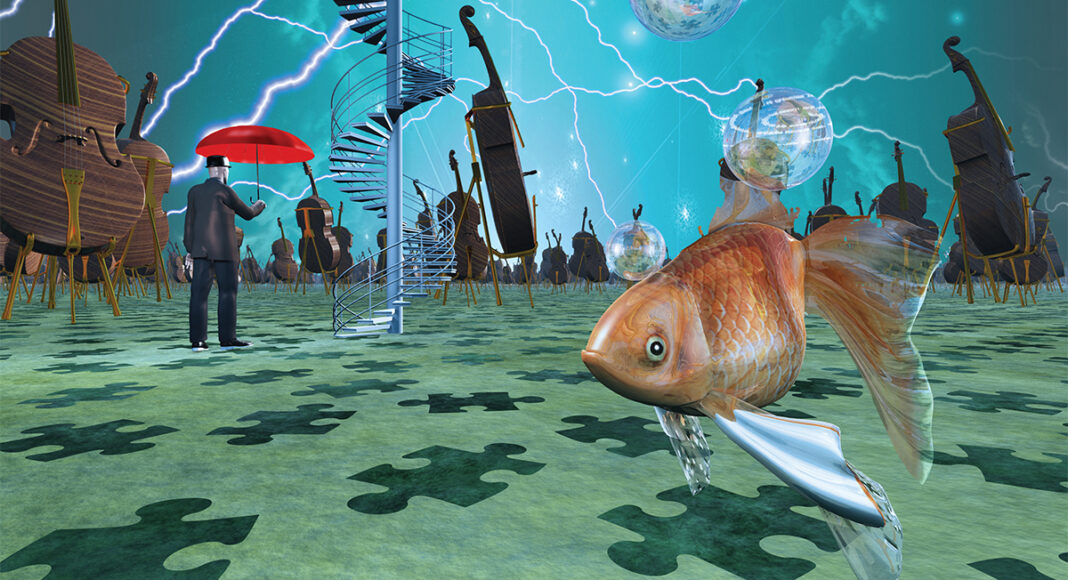[dropcap]“OK[/dropcap], so I’m sitting in the end zone of this giant football stadium that’s somehow accessible through a door in my kitchen. I’m getting a haircut from Kim Jong-Un while a giant armadillo wearing a red beret does his best impression of John Wayne … or Lil Wayne, I can’t remember. Whatever. Anyway …”
Is there anything quite as lethal to a promising social gathering than talking about a dream you had last night? For many people, dreams are narcissistic non-sequiturs, mindless absurdities that can shut down a conversation cold. To them, dreams belong in the same conversational no-fly zone as politics, religion and Irritable Bowel Syndrome.
For others, though, dreams are anything but trivial. They are metaphorical, even poetic reflections of a person’s inner state, a series of symbolic messages from the subconscious mind to the conscious mind, compelling proof that sleeping can be more effective in problem-solving than brooding or worrying.
On March 11, curious and open-minded dreamers will converge for the second annual Festival of Dreams at Santa Cruz’s Louden Nelson Center. The event will serve as a kind of freewheeling marketplace of ideas for those interested in the potential of dreams to provide insight and inspiration and to solve emotional and psychological problems.
The festival will feature a keynote address by author, lecturer and dreamwork specialist Gayle Delaney, who co-founded the International Association for the Study of Dreams. It will also include workshops on dreaming and a panel discussion of educators, psychotherapists and other professionals from a variety of viewpoints on dream interpretation. And, in what might turn out to be particularly valuable to attendees, the event will also feature a series of free, private, one-on-one, half-hour dream consultations.
The Festival of Dreams took place last year, under the name “Dream Caravan,” at Inner Light Ministries in Soquel. The event’s founder, Santa Cruz dreamwork practitioner Katherine Bell, says she and her colleagues wanted to raise the profile of the gathering by changing its name and location.
“We weren’t sure that ‘Dream Caravan’ really said what it is,” she says. “We wanted it to be more recognizable. It’s about dreams. People on our planning team do all kinds of styles of dreamwork, so we decided to broaden it out and offer people a selection of different ways of working with dreams.”
Dream interpretation is certainly nothing new. In the last century, the field was dominated by grand, overarching theories offered up by brand-name figures in psychology, mostly Sigmund Freud, Carl Jung and Fritz Perls. In recent years, however, it’s become more nuanced, with a recognition that the one-size-fits-all approaches of Freudian and Jungian dream interpretation can be limiting or even meaningless to many people.
What today’s dream therapists recognize is that although dreams deal in powerful metaphors, they can have wildly different meanings from person to person. “Dreams are incredibly personal,” says Bell. “We could look up online what a dream about a horse means. But it’s more important to me to understand what your experiences with horses are. Were you ever hurt by a horse? What do they mean to you, as opposed to what they mean culturally? And that’s the problem with dream dictionaries. You might get some kind of cultural background, and there’s some benefit to that. But what’s the personal story there?”
Keynote speaker Gayle Delaney, who attended the C.G. Jung Institute of Analytical Psychology in Zurich, has developed what she calls “the dream interview,” a method to discern the distinct meanings that dream metaphors have for any given individual, which may conflict with Freudian or Jungian interpretations.
“If you have a dream about a cat and I have a dream about a cat, and five other people have dreams about cats,” she says, “how can they say, ‘Oh, you’re looking at the archetype of the death goddess that so-and-so says represents the feminine principle’? Freud might say cats are your mother. That may be true, but you have no way of knowing that until you sit down with someone.”
Delaney stresses that dreams are expressions of the unconscious mind and can help solve problems even for those who don’t remember their dreams. Still, keeping a dream journal and developing a habit of actively remembering dreams can be rewarding, she says.
More fundamentally, she believes dreams often present a picture of a person’s inner life that is much more in line with who they really are than their social roles suggest.
“I’ve had so many so-called ‘gurus’ in my practice who are lonely, wretched people, and their dreams help them see how lonely they are because they won’t accept anyone as their equals,” says Delaney. “And I’ve had people who lead very quiet lives but who have dreams of great beauty and ecstasy. And they live lives of generosity and love. No one would see them as an enlightened person. But they are.”
The Santa Cruz Festival of Dreams will be held Sunday, March 11, 11 a.m. to 5 p.m., at Louden Nelson Center, 301 Cedar St., Santa Cruz $25 advance; $35 at the door; festivalofdreams.net.













